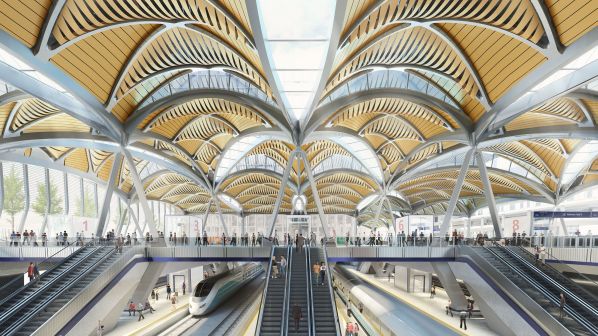The 338km high-speed line between London, Birmingham and the north of England will be built in three phases. The review will produce a report in the autumn, ahead of a “notice to proceed” decision for Phase 1 which is due to be made by the end of the year.
The review will be chaired by Mr Doug Oakervee, the former chair of HS2, with Lord Berkeley as deputy chair. The review also includes a panel consisting of Ms Michele Dix, Mr Stephen Glaister, Mr Patrick Harley, Sir Peter Hendy, Mr Andrew Sentance, Mr Andy Street, Mr John Cridland and Mr Tony Travers. Each member will focus on a specific area of expertise, and will feed into the report’s conclusions.
The review will examine whether HS2 Ltd, the company overseeing the project, is in a position to deliver the project effectively, taking account of its performance to date and any other relevant information.
It will also consider the full range of benefits from the project, including:
- capacity changes both for services to cities and towns along the HS2 route and those not connected with HS2
- connectivity
- economic transformation including whether the scheme will promote inclusive growth and regional rebalancing
- environmental benefits, in particular for carbon reduction in line with net zero commitments, and
- the risk of delivery of these and other benefits, and whether there are alternative strategic transport schemes which could achieve comparable benefits in similar timescales.
The project’s rising costs have been a point of concern, and the review will consider whether HS2 Ltd’s latest estimates of costs and schedule are realistic and are comparable with other British infrastructure projects, as well as looking at why any cost estimates or schedules have changed since the most recent previous baselines.
The review will also look at:
- whether there are opportunities for efficiencies
- the cost of disruption to rail users during construction
- whether there are trade-offs between cost and schedule; and whether there are opportunities for additional commercial returns for the taxpayer through, for example, developments around stations, to offset costs, and
- the overall affordability of Phase 1, and what what would be required to deliver the project within the current funding envelope for the project as a whole.
The review will also look at whether the assumptions behind the business case, such as passenger numbers and service frequencies, are realistic, including the location and interconnectivity of the stations with other transport systems, and the implications of potential changes in services to cities and towns which are on existing main lines but will not be on HS2.
The government is also looking for “realistic potential” for cost reduction, and has directed the review to consider whether changes to the scope of the project could facilitate this, including:
- reductions in design speed
- making Old Oak Common the London terminus, at least for a period
- building only Phase 1 (to the north of Birmingham)
- combining Phases 1 and 2a (Crewe), and
- different choices or phasing of Phase 2b, taking account of the interfaces with Northern Powerhouse Rail (NPR).
The report will include the direct cost of reprioritising, cancelling or de-scoping the project, including penalties, the risk of legal action, sunk costs, remediation costs, supply chain impact, and an estimate of how much of the money already spent, for instance on the purchase of land and property, could be recouped.
The review will also consider whether and how the project could be reorientation with a particular focus on reprioritising the NPR’s common sections with HS2 Phase 2b over delivering the southern sections of HS2. The review will also look at whether any improvements would benefit the integration of HS2, NPR and other rail projects in the north of England or Midlands, and any lessons from the project for other major projects.
The review comes after the House of Lords Economic Affairs Committee published a report on May 16 questioning the economic case for HS2, saying the project should not go ahead without a new assessment of its costs and benefits.
Last week, the DfT selected a joint venture of FirstGroup and Trenitalia UK as operator of the West Coast Partnership (WCP) franchise, which includes the initial phase of operations on HS2.
For detailed information on rail projects around the world, subscribe to IRJ Pro.

